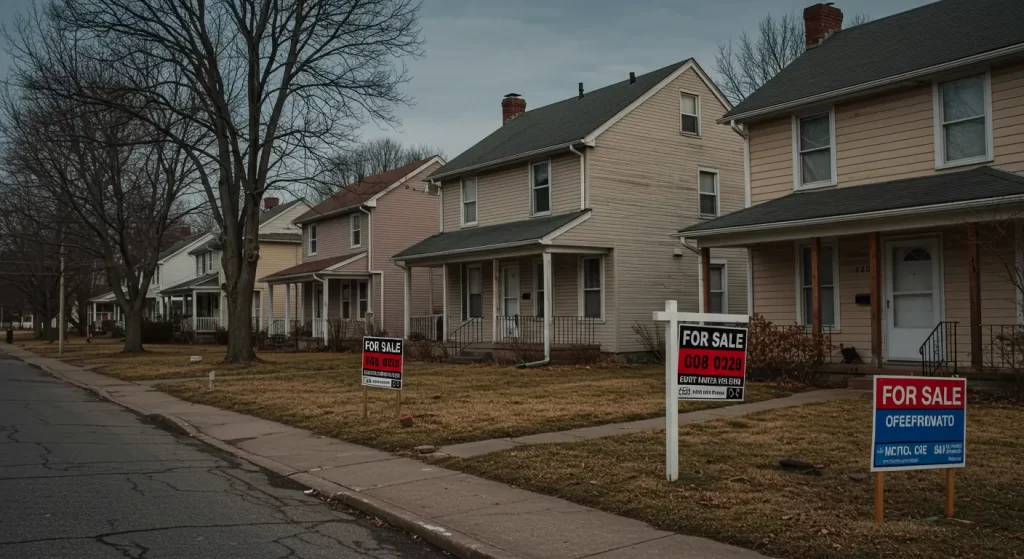Is the U.S. housing market on the precipice of a major correction, or is it just experiencing a temporary slowdown? Recent data paints a concerning picture, suggesting potential instability that could impact buyers and sellers across the country. Is now the time to sell or double down on investments?
Is the real estate market about to crash?
While a full-blown crash is uncertain, key indicators such as plummeting sale prices in some areas, rising inventory, and shifts in buyer behavior suggest a significant correction is underway. Careful analysis and strategic planning are crucial for navigating this volatile market.
The Real Estate Cliff: Is the Housing Market About to Implode?
- The Canary in the Coal Mine: Dramatic price drops in some areas signal underlying problems.
- Rising Inventory: More homes on the market means increased competition and pressure on prices.
- Buyer Behavior Shift: Economic uncertainty is driving changes in how people buy homes.

This article explores these trends, offering data-driven insights into local and national patterns. By staying informed, you can better navigate the current volatility and prepare for what’s ahead.
1. The Data Doesn’t Lie: Key Takeaways
- The median sale price in Bellport plummeted by 57.8% last month – a dramatic warning.
- Days on the market are increasing nationwide, signaling slowing sales.
- Sale prices are showing significant fluctuations and unpredictable behavior.
- New construction is making up a historical percentage of the market
Understanding these data points is key to navigating the housing sector.
2. Market Overview: Current Trends and Warning Signs
Recent shifts in the housing landscape are raising eyebrows among experts. Both national and local data reveal patterns that could signal significant changes ahead. Is this a temporary blip, or is it the beginning of a larger correction?
- National Housing Trends and Statistical Insights
- Nationally, inventory levels are rising, and buyer behavior is evolving.
- The median sale price has seen fluctuations, with some regions reporting declines while others remain stable.
- Days on the market are increasing, indicating slower sales in many areas.
- Experts attribute these changes to shifting economic conditions and buyer preferences.
- Local Market Case Studies: Bellport and Beyond
- Locally, Bellport’s housing sector has seen dramatic changes.
- Last month, the median sale price dropped by 57.8% to $685K.
- Compared to nearby cities like Commack and Smithtown, Bellport’s trends stand out, highlighting the importance of local market analysis.
- Buyer behavior is also shifting, with many opting for homes in familiar metropolitan areas.
3. The CEO Speaks: Expert Insights on the Housing Market’s Future
The following video is extremely relevant, which include an interview with Leo Pareja, CEO of eXp Realty (NASDAQ: EXPI), discussing the current state of the real estate market and the outlook for 2025:
Key takeaways from the video include:
- Cautious Optimism: While the market has been slow, there’s a sense of hope for a pickup.
- Interest Rate Impact: The 10-year treasury is a crucial factor influencing mortgage rates.
- The Rise of New Construction: Homebuilders are increasingly offering incentives and downsizing to maintain affordability, gaining an edge over resales.
- Recent data highlights trends that could reshape the landscape for buyers and sellers.
These metrics play a key role with shifts in behavior and dynamics.
4. Emerging Influences and Expert Perspectives
Economic shifts and seasonal changes are reshaping the housing landscape. Experts are closely monitoring these trends to understand their impact on prices and buyer behavior. From rising inventories to builder incentives, the market is evolving rapidly.
- Impact of Economic Factors and Seasonal Shifts
- Rising mortgage rates and inflation are influencing buyer decisions.
- Seasonal shifts, such as the spring thaw, are also contributing to increased activity.
- Lawrence Yun, Chief Economist at the National Association of Realtors, notes, “The spring season is traditionally a time of renewed momentum in the housing market. This year, we’re seeing a combination of rising inventories and buyer interest.”
- Homebuyer Behavior, Cash Sales, and Builder Incentives
- More individuals are opting for cash sales to avoid high mortgage rates.
- Builders are responding with incentives like closing cost assistance and mortgage-rate buydowns to attract buyers.
- For example, in Bellport, builder incentives have led to a slight uptick in sales despite the overall price decline.
- Comparative Regional Analysis: U.S. Market vs. Local Markets
- While the U.S. market shows signs of stabilization, local markets like Bellport and Long Island are experiencing unique trends.
- Bellport’s median sale price dropped significantly, while Long Island saw an increase in demand.
These disparities highlight the importance of local market analysis. Buyers and sellers must consider regional dynamics to make informed decisions.
5. The Big Picture: Navigating a Volatile Market
The real estate market is complex and impacted by various factors. Here’s how to stay prepared:
- Understand Local Trends: Pay close attention to data specific to your area.
- Monitor Economic Indicators: Track interest rates, inflation, and job growth.
- Seek Expert Advice: Consult with real estate professionals and financial advisors.
This requires proactive analysis and informed decision-making.
6. Investing in Uncertain Times: The Motley Fool’s Recommendation
If you are looking to invest in real estate or find high-quality companies consider:
- This video is sponsored by The Motley Fool, a company that provides investing insight and stock recommendations for investors of all skill sets and risk levels.
- Action item Click here to get get ten stock picks now from their popular product Stock Advisor.
The Motley Fool Stock Advisor returns are 914% as of January 7th 2025 and are measured against the S&P 500 returns of 174% as of January 7th 2025.
Conclusion: Staying Informed and Making Strategic Decisions
The housing landscape is marked by significant shifts, with both challenges and opportunities emerging. While areas like Bellport are showing concerning trends, others like Long Island are demonstrating resilience.
Experts point to seasonal shifts and economic factors as key influences. Rising inventories and builder incentives offer hope, but understanding local dynamics remains crucial.
In this uncertain environment, careful planning and data-driven strategies are essential. By staying informed about market trends and seeking expert advice, you can navigate the complexities of the current real estate sector.
FAQ
Will the housing market crash in 2025?
Experts are divided on this, but many agree that while a crash seems unlikely, certain factors—like rising interest rates—could impact the market. Want to know how to protect your investment? Read on for a deeper dive into the market’s future.
Are we in a housing bubble?
While some areas show rapid price increases, a full-on bubble isn’t evident across the nation. Curious about which markets are at risk? Keep reading to discover which regions could be more vulnerable.
What happens when a housing bubble bursts?
A burst causes home prices to drop sharply, potentially leaving homeowners with negative equity. What does this mean for you? Explore the long-term effects of a market collapse in our article.
Who benefits in a housing crash?
Cash-rich investors can scoop up undervalued properties, while first-time buyers might find lower prices. Want to know how you can leverage a market downturn? Learn about smart strategies for any situation.
Housing market predictions for 2026: What to expect?
Suburban areas are likely to see growth, thanks to new buyers entering the market. Want to know which areas could thrive or struggle? Check out our detailed predictions for the next few years.
What happens if the housing market crashes?
A crash could lead to falling property values, foreclosures, and a broader economic impact. Wondering how a crash could affect your finances? We break down the critical steps you can take to minimize damage.
How can I protect myself from a potential housing market collapse?
Diversifying your investments, reducing debt, and staying informed are key. Not sure how to safeguard your investments? Our expert advice can help you navigate these uncertain times.



